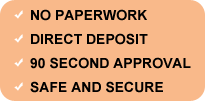
Cash Advances are meant to keep you financially afloat between pay periods and therefore are meant to be paid back as early as your next paycheck. That is one of the reasons states can cap the maximum amount to be borrowed at as low as $500 or as a percentage of your monthly income.
When you take out a loan, you generally fill out an application and provide the lender with personal and banking information so that the funds can be automatically deducted from your account on the agreed upon due date. By submitting your request, you are agreeing to pay the fees and interest as set out in the agreement. When the due date arrives you have a couple of options:
It's important to see these loans as only temporary, secondary solutions. Before you sign, consider the following alternatives:
Contact your creditors directly and request more time to repay your debt. Make sure you find out about any late charges, fees or interest that will be incurred for this service. One way to avoid the need for credit is to plan ahead.

